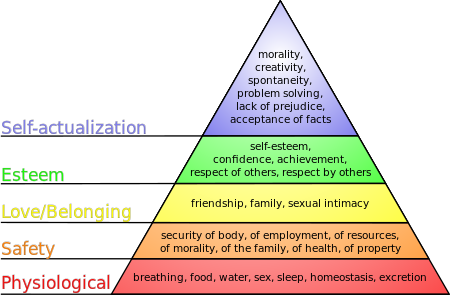Nevitt Sanford's theory of challenge and support is about student learning and the belief that, in order for student development to occur there needs to be equal amounts of challenge and support. The quote below summarizes generally what Sanford is getting at and it may be familiar to you.
Professor Bill Drury: “If you begin to feel uncomfortable, pay attention—you are about to learn something.” SourceThis relates back to Maslow's Hierarchy of Need, shown in the diagram below.
(Source: Wikipedia)
Maslow believes that the most basic needs must be met before anything beyond those needs can be addressed. This is connected to challenge and support because in order for students to feel like they can face challenges confidently they need to believe there is a strong support network to fall back on. However, balance of the two is the most important factor - too much support and students can become complacent and comfortable, they aren't faced with situations that encourage them to push themselves beyond their safety zone or general norms. Alternately, if students feel that they are being constantly challenged they can become overwhelmed and can believe themselves as incapable or unable to address the stream of difficult demands on their abilities.
As an Resident Advisor being able to challenge and support your residents equally is a delicate balancing act. We must adjust our techniques dependent on the student and what we perceive their level of independence and dependence is throughout the year. Some residents will need more support than others and some residents will just need a hand to point them in the right direction, there is no one technique that works for every resident. If we believe that our role is to support residents in developing a strong sense of independence and self responsibility then we must make sure that we are not babying them or demanding beyond their abilities. Recognizing that residents come from differing family backgrounds with different life experiences is important.
Student Life staff are well versed in the theory of challenge and support. If you are wanting more information or resources surrounding this topic, don't be afraid to reach out to them.
Bibliography
Ward, Kelly, Lois Trautvetter, and Larry Braskamp. "Putting students first: Creating a climate of support and challenge." Journal of College and Character 6.8 (2005).

No comments:
Post a Comment